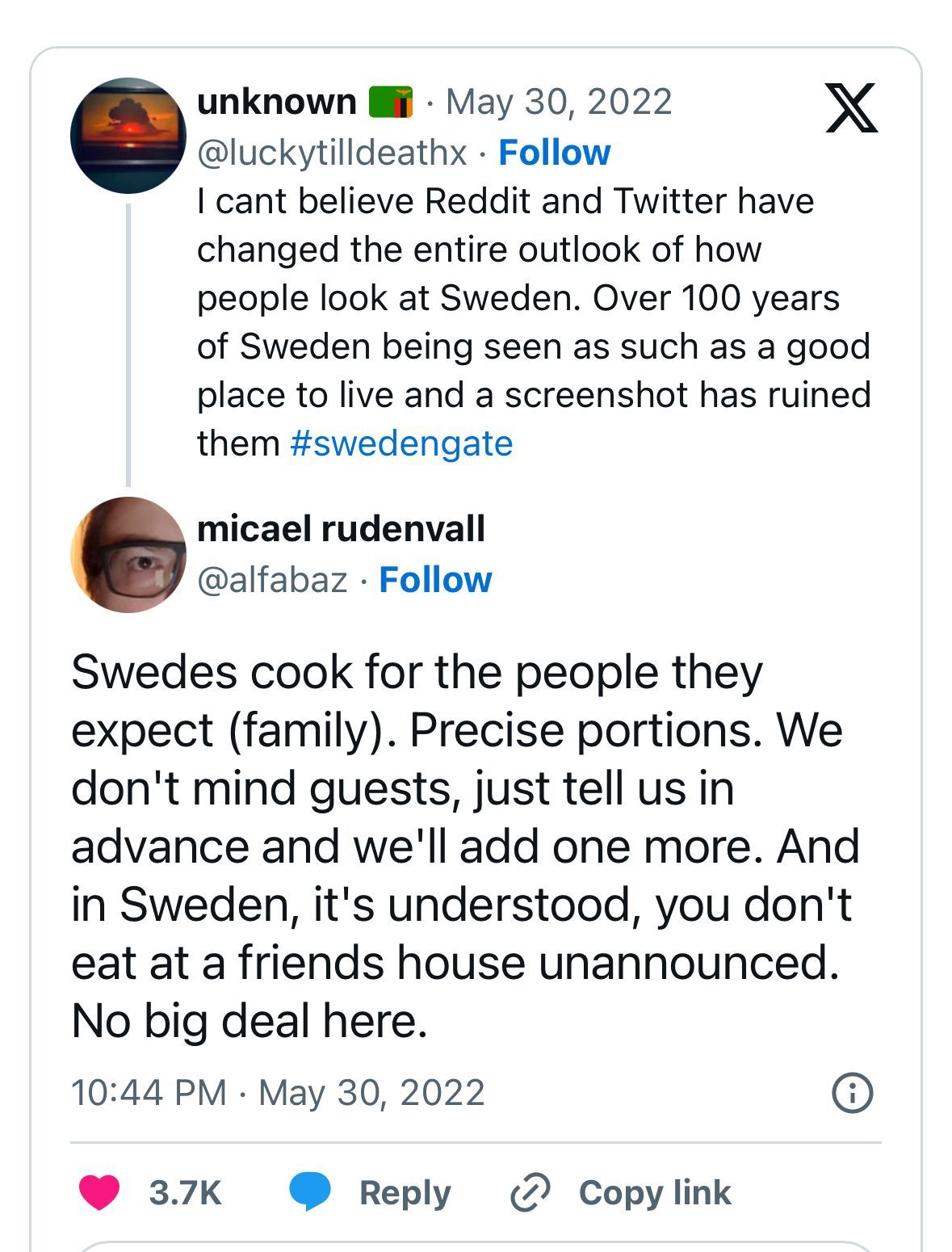The #Swedengate Story
A cultural clash over dinner

What is #Swedengate? How the Internet reacted to Sweden's dining tradition
#Swedengate became a trending topic after internet users discovered that Swedes often do not feed their house guests. This revelation sparked a heated online debate about Swedish hospitality.
The controversy began on Reddit, where a user asked, “What is the weirdest thing you had to do at someone else’s house because of their culture/religion?” One response stood out: a user recounted being asked to wait in a friend's room while the family ate dinner. This post quickly went viral, and the hashtag #Swedengate started trending on Twitter. Thousands of people shared their experiences, with many non-Swedes criticizing the practice and Swedes defending it.
Do Swedish people not serve food to their guests?
While it may seem surprising to many, not serving food to guests is a common practice in Sweden. This tradition is rooted in the desire to avoid disrupting the guest's own family dinner plans.
Linda Johansson explained in an op-ed for The Independent that Swedes prefer to eat with their own families and avoid interfering with the routines of others.
Many Swedes confirmed this tradition online, emphasizing that it is not about being inhospitable but about respecting the guest's family plans. One user tweeted that Swedes cook precise portions for their families and appreciate advance notice if guests will be joining them for a meal.
Another person explained that this practice shows respect for the visiting child's parents, who may have already planned dinner.
Family mealtime is considered an important part of the day in Sweden, and disrupting another family's meal is seen as inconsiderate.
Why was there outrage?
As the discussion gained traction, many users were offended by Sweden’s tendency not to serve their guests. Some believed that children, even if they are guests, should be fed in case they haven’t eaten all day.
One Twitter user questioned, “But why are you inviting children for a playdate without the thought that you NEED to feed them? Kids get tired and hungry after playing.”
Another person, raised in Stockholm to Persian parents, shared that their Swedish neighbor left them alone and hungry in her bedroom while she ate dinner with her family: “I had a good friendship with my Swedish neighbor FOR SEVERAL YEARS & every time I was at her house during dinner-time she would leave me ALONE in her bedroom NOT SAYING A WORD TO ME, left me alone for about 20-30 minutes while I sit upstairs with a hungry stomach.”
Others cited their own cultures as reasons to never leave a guest hungry. An Instagram account, @LoverofGeography, created a map highlighting which European countries are more likely to feed their guests. Scandinavian countries like Norway, Sweden, and Finland were marked as “very unlikely to give you food,” while Mediterranean countries like Italy, Spain, and Greece were deemed “almost always” likely to serve food to their guests.
Ethnologist Håkan Jönsson's explanation
Ethnologist Håkan Jönsson, one of the few experts on Swedish customs regarding food, was bombarded with questions. Were Swedes stingy?
Håkan Jönsson conducted a research project on the criticized custom, making him aware of how special the main course at dinner was in meal contexts. The friend who had to wait in the room was called down for dessert if the children had been playing for a couple of hours. There was always coffee and snacks offered; anything else would have been impolite.
The reason for not inviting the child's friend was based on respect for the family's integrity, not interfering with other families' habits or how they raised their children. Implicitly, it could suggest that the child might not get food at home if invited for dinner.
“Therefore, you didn’t send home a full child. There was a kind of unspoken respect for the other family's meal, especially between the mothers,” says Håkan Jönsson.
Culturally conditioned
He explains that the custom was one of the most common stories that emerged in the Culture Clash Cushion project conducted in 2013.
“It was perceived as the most odd – something you didn’t understand at all if you came from another culture,” says Håkan Jönsson.
The custom had never been properly researched but is relevant as it highlights many aspects of the meal, the view of the family, silent norms, and cultures in transformation. Before the summer, a questionnaire was sent out via the Folklife Archives to investigate the matter.
“Usually, 70 to 100 responses come in, but this time 400 responses came in within a week.”
The survey showed that many had experienced the phenomenon but had perceived it differently.
Different perceptions
“For some, it was very strange and unpleasant. Some said their parents didn’t want them to play with Swedish friends. It was sometimes perceived as rude or directly hostile not to offer food,” says Håkan Jönsson.
For others, it was nothing they thought about; it was just the way it was, or it was something exotic and cozy. They got the chance to look at their friend's toys or play computer games.
Practical reasons could be why the friend was not invited for dinner. Perhaps the dinner was planned for four people, or the table was too small.
"No free lunches"
But if you dig a little deeper, the custom is about a strong focus on independence, as the saying goes, there is no such thing as a free lunch. The meal is fundamentally something given as a gift to create alliances. Not feeding someone else’s child was a way not to put the other family in debt.
Long ago, there was something that might explain the Swedish coffee culture, according to Håkan Jönsson. Coffee has been offered for a long time, but a tradition of spontaneously eating dinners at someone else’s house has never existed. When cooked food was offered, it was under regulated circumstances.
“The origin of this is probably found in the storage culture. In the Nordic countries, it was necessary to produce food for twelve months within only four months, and then it was essential to keep a close eye on how the food was consumed,” says Håkan Jönsson.
Silent customs should be explained
If this hypothesis holds, the phenomenon of not inviting your child’s friend for dinner should exist in the other Nordic countries.
“It does, but now it was apparently time to be horrified over Sweden. It is also very convenient to criticize someone with such high self-esteem as Sweden has,” says Håkan Jönsson.
Customs often have more complicated explanations than Swedes being a bunch of stingy people. But that doesn’t stop many immigrant children from feeling they weren’t invited to eat because of their background.
“Obvious habits are rarely verbalized; you almost can’t. We need to get better at verbalizing silent customs – things we just do,” says Håkan Jönsson.



